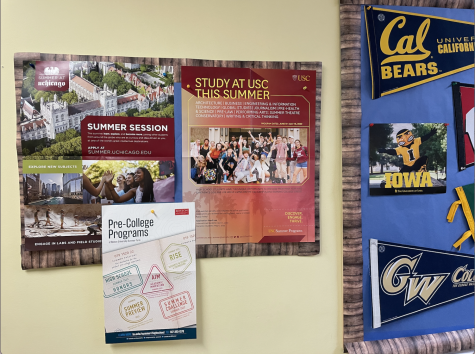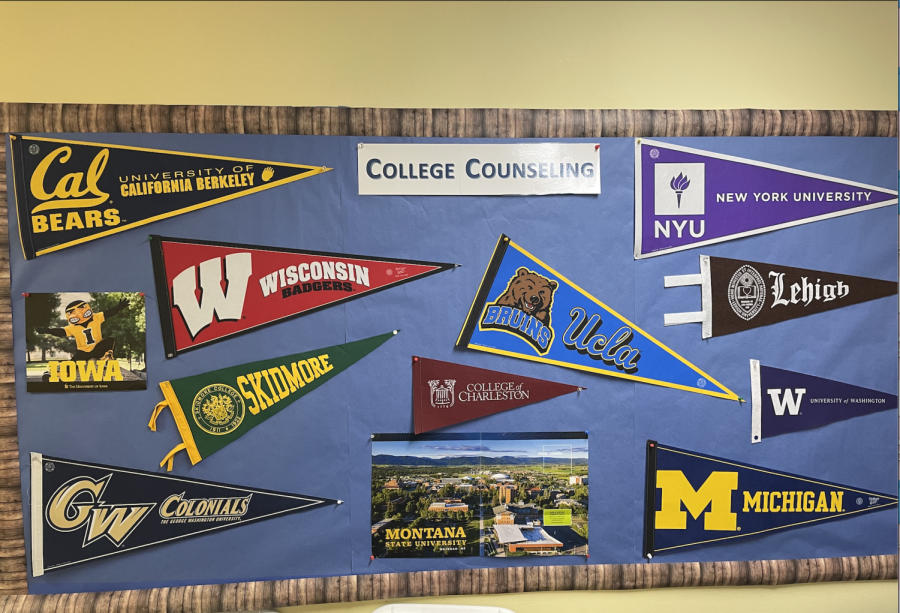Grappling with College Applications as a First-Generation American
flags for different universities and colleges outside of the college counseling office at Milken
I dropped out of AP Chemistry the day before school started.
It was a late August afternoon and I was finishing my summer AP Chem homework when I had an epiphany: I was completely wasting my time.
I realized that I would be taking a class that doesn’t interest me, would cause me stress, and take up a chunk of my time. But most importantly, it was a class that I was taking just so it could look good for college.
Being the first child in your family to go to an American college is always stressful. Your parents are clueless about the long and complicated college application process, so you have to do most of the heavy lifting. They don’t know how the SATs work and why it’s graded out of 1600 instead of 100, and they don’t know what the difference is between early decision and early action is.
Although my parents won’t really be able to help in terms of the actual applications, growing up with parents who went to a university and high school in another country has given me a new perspective that has changed the way I think about my life.
Luckily, I have been given two parents who have always been very supportive. Since I was young, my parents have told me that it doesn’t matter whether I go to an Ivy League school or a community college; what matters is if I am happy or not.
Because they never went to college in the US, the whole application system was a culture shock for them. After a meeting the Milken college counseling team had for parents, my dad told me, “the whole thing seems like such a long, complicated, and stressful process. There’s so much to consider and a lot of things to do.”
My parents’ own college applications didn’t take months, they took minutes. In Mexico (where they are from), all they had to do was fill out the normal information like their name, address, and what they wanted to study. They didn’t have essays, personal statements, or questions to answer. They didn’t have transcripts with all their APs, activities, internships, or revolutionary companies. Students didn’t take the ACT or SAT. Instead, they would take the entry exam that each university had. Most people didn’t even apply to more than two universities.
By contrast, the college admissions process is a lot more competitive in the US. There have been multiple times when I would compare myself to my friends and classmates, making me feel very behind in the college game. Do I have enough extracurricular activities? Am I taking enough APs and honors classes? Does my transcript look bad? Will I even get into college? All these questions have circled my head not because I was actually worried about it, but rather because others around me were worrying about it.
American society has implemented the idea that the whole goal line of school is to get into college so you can have a good life. My mom has observed that “high school in Mexico is not about how it’s going to look on your applications or what you’re going to do in college, but rather learning what there is to learn in high school.”
It’s a cycle that I have felt since an early age. You’re taught to do well in middle school because it gets you into Honors classes for high school. You’re taught to do well in honors classes so you can get into APs. You’re taught to take APs because they look good on your transcript, which then looks good for college admission boards.
Obviously, there are socioeconomic factors for why the application system in Mexico is shorter and less stressful. Not to mention, my parents graduated high school in the ’90s. Although their experience is not something that I can apply to my upcoming journey, it has taught me something.
“High school in the US takes away from your childhood and instead of focusing on literally your last years of being a child, you have to focus on the future,” my mom said.
Life is short and happiness is fleeting. When I look back at the things I did 10 years earlier, I don’t want the end result to be regret. Life should be enjoyable and not filled with stress, so I am going to try to do everything I can to choose happiness and something I enjoy doing.


When I was deciding whether to drop AP Chemistry, I was struggling with the pressure of thinking I was supposed to care about these classes and not wanting to waste my energy on something that didn’t interest me. When I decided not to take a summer college course, I decided against suffering through the summer just to make my transcript look better.
I don’t want my last years of high school to be filled with competition and stress. I want to look back when I am older and not regret the choices I made or the opportunities that I didn’t take just because I wanted to get into the top universities.
So as crazy as it sounds, being raised in a family in which my parents don’t have any idea how the American college system works has changed my life.




